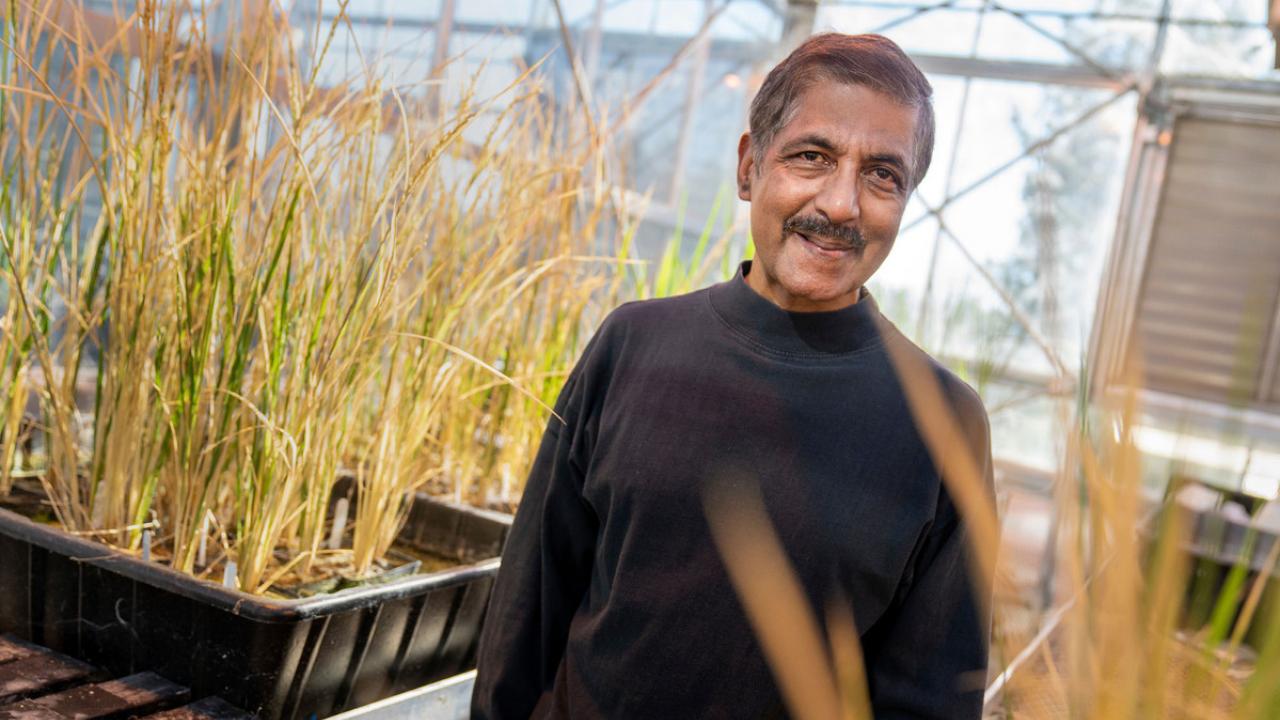
Cloning Food Crops for Higher Yields: Venkatesan Sundaresan Wins Faculty Research Award
Quick Summary
- Last year, Distinguished Professor Venkatesan Sundaresan and his colleagues published in Nature a method that allowed them to produce clonal seeds directly from plants, bypassing the sexual reproduction process
- Replicating this process in the lab could prove vital to providing the world’s farmers with high-yielding, disease-resistant or climate-resistant food crops
- For the research, Sundaresan was recognized with the 2018-2019 College of Biological Sciences Faculty Research Award
At the cellular level, plants and animals work similarly when it comes to sexual reproduction. An egg cell and a sperm cell unite to form a zygote, a cell that continuously divides to eventually form an embryo and eventually, the organism’s entire body.
But there are exceptions to the rule. In the animal world, some female fish, reptiles and amphibians can reproduce asexually, a process called parthenogenesis. In plants, this process is called apomixis.
Typically, farmers grow their crops from hybrid seeds, which are the result of crossing two varieties of a crop with desirable traits. But these hybrids don’t produce offspring with the same traits, a pricey problem that requires farmers to purchase new hybrid seeds each year.
“For the past 20 to 25 years, scientists in the field have dreamed about making self-reproducing hybrids, so that you could produce hybrid seeds cheaply,” said Distinguished Professor Venkatesan Sundaresan, Department of Plant Biology.
In December 2018, Sundaresan, along with colleagues from his lab, Iowa State University and the French National Institute for Agricultural Research published in Nature a method that allowed them to produce clonal seeds directly from plants, bypassing the sexual reproduction process. Replicating this process in the lab could prove vital to providing the world’s farmers with high-yielding, disease-resistant or climate-resistant food crops.
For the research, Sundaresan was recognized with the 2018-2019 College of Biological Sciences Faculty Research Award.

Discovery—boom baby!
According to Sundaresan, the key to unlocking this revolutionary discovery was foundational science. It began with a research question, “how does a fertilized egg become a zygote?” In isolation, an egg cell and a sperm cell remain in static states, but their union during fertilization initiates a cascade of developmental events.
“We were really fascinated by this question, ‘What is it that triggers the egg cell to change so drastically?’” asked Sundaresan. “To do this, we decided to look at what genes are switched on after fertilization, because if specific genes are triggered with the fertilization of the egg, then very likely those genes are determinants of the future fate of the egg cell.”
By studying the transcriptomes of single cells in rice (Orzya sativa), Sundaresan and his colleagues identified a gene called BABY BOOM1 (BBM1) that played a major role in embryonic development. Previous research showed that a related gene, when switched on in the leaves of Arabidopsis thaliana, led to the formation of embryo-like structures.
“This is clearly a gene that’s capable of making embryos happen where there are no embryos before,” said Sundaresan. “That can’t be an accident.”
When the team looked at plant embryos, they found that BBM1 was expressed by the genetic material taken from the sperm rather than the egg. Sundaresan thought, “If this is a key gene you really need from the male, what if you could just switch in on in the female?”
So Imtiyaz Khanday, a postdoctoral fellow in his lab, did just that.
“Imtiyaz expressed this gene in the egg cell through a different promoter, a different regulatory sequence and sure enough, the egg cell instead of stopping to wait for fertilization just went on to make an embryo,” said Sundaresan.

Invigorating the hybrids
In 2016, Sundaresan started collaborating with colleagues from the French National Institute for Agricultural Research after he learned about their work eliminating the meiosis process from rice development via gene knockouts. The researchers replaced the meiosis process—which usually results in daughter cells with only half the chromosomes of each parent—with mitosis, which ensured that the egg cell obtained complete chromosomes from each parental plant.
“If you could make this egg cell not remain an egg cell but become a plant, that plant would now be a clone,” said Sundaresan, whose team together with his new collaborators, demonstrated that such asexual reproduction was feasible in crops and produced multiple generations of clones.
Sundaresan and his colleagues are trying to identify other genes that might make the cloning process more efficient. Since asexual reproduction has evolved in many different plant species, any species, in theory, has the genetic makeup to produce viable clonal seeds, according to Sundaresan. They just need the right genetic tweaking.
"By making hybrid crops that clonally produce just as efficiently as offspring, Distinguished Professor Sundaresan has illuminated a path towards a future in which farmers can reap the benefits of sustainable hybrid seeds without the need to purchase new seeds each season,” said College of Biological Sciences Dean Mark Winey
“Hybrid vigor” refers to the high quality of crops or plants resulting from hybridization. It’s what makes hybrid seeds such a desirable commodity in the agricultural world. Sundaresan’s clonal seeds, if taken to full-scale application, could ensure “hybrid vigor” remains intact without the need for new seeds.
“In a way, we are copying what happens in nature,” he said.
